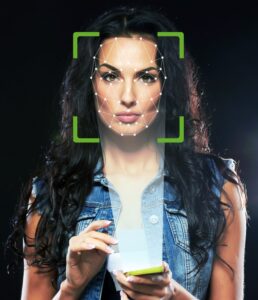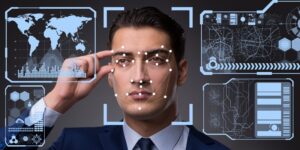Privacy in the Age of Facial Recognition: Everything You Need to Know
Privacy in the Age of Facial Recognition: Everything You Need to Know
Facial recognition is a biometric technology primarily used to identify an individual or verify their identity using their face. Facial recognition software can capture, analyse, and compare patterns based on a person’s facial features. The use of the AI-powered technology is expected to become more commonplace in the new decade. Today, facial recognition is considered the most natural of all biometric technologies.

Facial recognition has been increasingly gaining popularity in the last few years. The technology is used everywhere from shopping malls, airports, venues, and is now heavily relied upon in a broad range of commercial applications. In 2019, the facial recognition market was valued at $5.07 billion. This figure is projected to rise to $10.07 billion by 2025. Keep reading to learn more about facial recognition tech including recent trends, benefits, and controversies surrounding this technology.
Recent Facial Recognition Trends The benefits of facial recognition technology are expanding into new end-user applications rapidly. For instance, the technology is gaining a lot of traction in the hospitality sector and the healthcare industry. The application of facial recognition technology is also extending to retail and banking, which is made possible by tech giants such as Apple offering facial recognition features in their latest releases. Here are some of the most recent facial recognition trends.
Healthcare in the Covid-19 Era Facial recognition software is becoming prominent in the healthcare sector. In the last few years, we’ve seen an increase in the use of facial recognition tech in hospitals, clinics, and healthcare organizations. The technology can replace devices or passwords to allow medical professionals quick access to records. In the wake of the Covid-19 pandemic, health experts are deploying facial recognition technologies in digital healthcare and disease outbreak prevention. For instance, the technology can be used to identify people with protective masks.
Security The success and popularity of facial recognition technology is largely attributed to its potential in security. The primary role of facial recognition technology is to identify human faces. Law enforcement agencies in various parts of the world are using the tech to identify and track criminals and terrorists. Airlines are increasingly implementing face authentication technologies in airports to improve security. Passengers will be able to use face detection tech to check-in, check their luggage, and board a plane.
Digital Banking and Ecommerce Identity and authentication have always been a challenge in the world of digital services. Trusting someone who is not physically present can be risky. There is a need for a fool proof security method to replace email, passwords, and other verification methods that are susceptible to hacking. Facial recognition could be the much-needed solution, and many digital banking and eCommerce platforms are turning to the technology to mitigate digital fraud. Using facial recognition in online transactions is quickly becoming commonplace.
Benefits of Facial Recognition Technology Facial recognition is a very powerful technology. The AI-based technology is becoming more popular every year. Here are some of the benefits that facial recognition technology affords governments, companies, and individuals.

Enhanced Security As stated earlier in the article, facial recognition technology can be used to improve security. Individuals can use facial recognition technology to unlock their mobile devices and set up a home security system. Security agencies can use the technology to identify terrorists and any other criminals just by scanning faces. Law enforcement groups can easily identify and track down thieves, burglars, and other criminals using face recognition technology.
Faster Identification/Authentication Facial recognition technology has greatly improved the process of identifying individuals in different settings. For instance, companies had to use actual people to make sure that only employees and authorized individuals access their premises. With facial recognition tech, you don’t need a guard to perform manual identification at the entrance. Companies only need to set up a face-scanning system at the gate, which is faster and more accurate.
Disadvantages of Facial Recognition Technology Like any other technology, facial recognition presents some drawbacks. Here are some of the concerns raised with respect to the widespread adoption and integration of facial recognition technology.
Privacy Privacy is a major concern when it comes to facial recognition technology. Government agencies and law enforcement groups can use facial recognition technology to identify and track anybody, any time using Closed-Circuit Television (CCTV) systems. People have expressed concerns about the potential of facial recognition technology in mass surveillance. Suddenly, we feel like we are being watched, and these fears aren’t unwarranted. The government can use facial recognition technology to track down people without consent in the same way it tracks criminals and terrorists.
Bias and Inaccuracy Facial recognition systems can be way off when it comes to identifying individuals, especially in situations where they have to identify in low light or use poor quality videos and images. These systems are often inaccurate, often misidentifying people, especially persons of colour and are generally unreliable. This creates the problem of racial bias. With the use of the technology quickly becoming commonplace in law enforcement, errors can cause a lot of damage in society. Misidentification can easily implicate innocent people and leave the real criminals to roam free.
How to Protect Yourself Against Facial Recognition Technology Facial recognition technology has a lot of potential. It can enhance security, streamline identification and authentication, but it also comes with some drawbacks. Privacy in public spaces is the biggest concern when it comes to the use of facial recognition technology by government agencies and law enforcement. Out in public, you can protect yourself from this intrusive technology wearing a face mask or anti-facial recognition glasses. You also need to protect yourself online on social media by turning off Facebook’s face detection feature, for instance. Government agencies are also known for spying on individuals on the internet, and there are ways to defend against that. You can secure your traffic with a VPN to protect yourself from other forms of online spying by the government and other malicious actors. A Virtual Private Network (VPN) is a service designed to help you establish a secure internet connection and maintain internet privacy. VPN hides your IP address and encrypts your internet traffic, allowing you to maintain complete anonymity on the world wide web.

Cliff Locks is a trusted confidant to CEOs, C-Level Exec, and high-potential employees to help them clarify goals, unlock their potential, and create actionable strategic plans.
Certified Professional Board of Director and Advisor.
I am a trusted confidant and advisor available by Zoom and by phone to be your right-hand man, who will make a significant contribution and impact on your way to success.
As a Trusted Confidant Advisor, I support you, along with your company’s strategic and annual operating plan. This plan may include marketing, sales, product development, supply chain, hiring policies, compensation, benefits, performance management, and succession planning.
Most successful leaders enjoy talking to someone about their experiences, which is why most develop a close relationship with a Trusted Confidant—a person with whom they feel free to share their thoughts, concerns, and ideas without fear of sharing too much or being judged by the people they lead, or their colleagues and superiors. I am a sounding board who will help you to better develop and see your ideas through to fruition.
The most effective Executive find confidants who complement their strengths and sharpen their effectiveness. Bill Gates uses Steve Ballmer in this way; Warren Buffett turns to vice chairman Charlie Munger. In the end, both the Executive and their organizations benefit from these relationships.
As your trusted confidant, I am always by your side, holding your deepest secrets and never judging. Everything discussed is held in complete confidence.
What many executives feel is missing from their busy life is a trusted business person who understands the holistic complexity of both their business and personal life.
I strive to provide solid financial, business, and family expertise and serve as a dispassionate sounding board, a role I like to call “Executive Confidant.”
By holding a safe place for the Executive to work on life path issues as well as direction, I repeatedly see remarkable benefits as personal values become integrated with wealth and family decisions, enhancing a more meaningful life.
As an Executive Confidant, I welcome a confidential conversation about the most important issues facing the business leader, including:
• Strategic planning toward your visions of success and goal setting • Operations, planning, and execution • Career transition • Retirement • Legacy • Kids and money • Marriage and divorce • Health concerns • Values and life purpose • Vacations • Mentoring & depth of the executive bench • Succession planning
When I do my job well, I facilitate positive action in both your professional and personal life. This consistently has a positive benefit on impacting people within the sphere of your influence.
The job of an Executive can be lonely. For various reasons, confiding in colleagues, company associates, family members, or friends presents complications. Powerful, successful, and wealthy individuals often isolate themselves as a protective reaction because of their inability to find people they can trust and confide in.
Successful people are often surrounded by many people, yet they insulate and isolate themselves to varying levels of degree. This isolation factor is not often discussed in the same context because the assumption is that success and wealth only solve problems. The false belief is that it does not create more problems, when, in fact, sometimes it creates a unique set of new challenges. Success and wealth do not insulate you from the same pitfalls that the everyday person faces. It may give you access to better solutions perhaps, and that is what I can help you achieve. Financial business success can create unique vulnerabilities, often overlooked as most people feel that the “problems” of the wealthy are not real-life problems.
The Executive Confidant can be particularly helpful when:
• Aligning life priorities with the responsibilities of wealth. • Wanting more meaning and purpose in life. • Desiring a candid and experienced perspective. • The answers often come from within, and we cannot arrive at them easily. • Clarity often comes into focus, with skilled questions and guided discovery. The right questions can be the first step in achieving ideal outcomes.
Who can you turn to when you need to find clarity? Who is your “Executive Confidant”?
Referrals to a team members or family members are always welcome.
Email me: [email protected] or Schedule a call: Cliff Locks
OptimizeLife #CEO #CFO #COO #BoD #CXO #Professionalpedia #TeamBuilder #success #beyourself #goals #lifeisgood #Influencer #Successful #Business #WorkLife #OfficeLife #Work #Office #Inspiration #Marketing #Tips #Leadership #BusinessIntelligence #InvestmentCapitalGrowth
